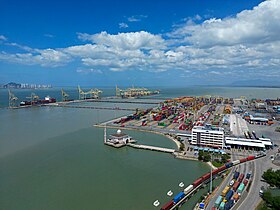檳城港口
檳城港口(英語:Port of Penang,馬來語:Pelabuhan Pulau Pinang,泰米爾語:பினாங்கு துறைமுகம்),是馬來西亞檳城州的一個深水海港。檳城港口分佈在檳威海峽沿岸,其中包括威省的五個碼頭,以及檳島喬治市的一個碼頭。截至2017年[update],檳城港口是馬來西亞貨運量第三大的港口,年貨物吞吐量達152萬標準箱,同時也是國內最繁忙的郵輪停靠港口。[3][4]
| 檳城港口 Port of Penang Pelabuhan Pulau Pinang | |
|---|---|
 位於北海北岸的檳城港口(2024) | |
 點擊地圖以全屏查看 | |
| 位置 | |
| 國家或地區 | |
| 位置 | |
| 坐標 | 5°24′57″N 100°21′58″E / 5.4157°N 100.36603°E |
| 港口代碼 | MYNTL[1] |
| 細節 | |
| 啟用 | 1786 |
| 運營者 | 檳城港務局 |
| 類型 | 沿海天然港 |
| 現有泊位 | 26[2] |
| 吃水深度 | 12.0米[2] |
| 統計 | |
| 年櫃量 | 152萬標準箱(2017年)[3] |
檳城港口於1786年隨着英國東印度公司在檳島設立自由港而建成,最初位於喬治市。[5][6]在英國殖民統治下,檳城港口在檳城的經濟中發揮着至關重要的作用,因為檳城的經濟很大程度上依賴於海上貿易。1969年,馬來西亞聯邦政府撤銷了檳城的自由港地位。[7][8][9][10]1974年,檳城港口遷至對岸威省的北海,以便處理更大型的集裝箱船。[11][12]如今,檳城港口依然是馬來西亞北部的主要港口和貨運樞紐。
歷史
編輯檳城港口於1786年由英國海軍軍官萊特(Francis Light)在創立喬治市時建成。萊特受英國東印度公司委託,負責在馬來半島建立貿易關係。他認為通過取得檳島,英國可以遏制荷蘭和法國在東南亞的領土野心。[13][14]由於檳島位於馬六甲海峽,即印度和中國之間的海上貿易路線上,因此可以作為「便利的貿易倉庫」。萊特還注意到,如果「馬來人、武吉士人和華人願意來此定居,且沒有過多的限制和稅收,這裏將成為東方的貿易中心」。[6]
檳城港口最初位於喬治市,作為自由港而建立,這意味着貨物可以在免稅、免關稅的情況下進行交易。[15]此舉旨在吸引該地區由荷蘭人統治的港口的商人。因此,進港船隻的數量從1786年的85艘,激增至1802年的3,569艘。[16][5][17]19世紀初,檳城港口成為東南亞香料出口的主要通道。[18][19][20]檳城各地收穫的香料將從喬治市港口轉運出口。
然而,檳城港口在馬六甲海峽的主導地位並未持續很久。1819年萊佛士開埠新加坡後,新加坡港口憑藉其更具戰略意義的地理位置,迅速超越檳城港口,成為該地區的首要港口。[21][22][23][24]
儘管如此,檳城港在整個19世紀依然繁榮。隨着蘇伊士運河的開通和蒸汽輪船的發明,使得檳城港口成為印度次大陸以東的第一個停靠港。[22]同時,馬來半島和暹羅南部的錫礦開採熱潮,推動了檳城港口發展成為主要的錫礦出口港,與新加坡港口展開直接競爭。[21][25]來自霹靂近打穀和暹羅的錫礦被運往喬治市冶煉,然後通過檳城港口出口到歐洲和美國的工業領域。[22]19世紀末的幾年間,檳城港口的錫出口量以及喬治市的錫進口量都超過了新加坡。[21]
1880年代末,為了擴建檳城港口,喬治市進行了大規模的填海造地工程。[25]填海後創建了如海墘街的沿海街道,同時建造了新的碼頭和倉庫,包括瑞典咸碼頭。1894年,喬治市和北海之間的首條跨海峽渡輪服務也開始開通。[26]前往北海的渡輪從海墘街沿線的幾個碼頭出發,如吉打碼頭(Kedah Pier)、義興街碼頭(Church Street Pier)和馬來聯邦鐵路碼頭(FMSR Pier)。
在第二次世界大戰日本佔領期間,檳城被改稱為「彼南」,檳城港口也被用作軸心國的主要海軍基地。[27][28]1942年至1944年間,喬治市曾作為日本帝國海軍、納粹德國海軍和意大利皇家海軍潛艇的停靠港和補給中心。[29][30]日本投降後,英國皇家海軍陸戰隊突擊隊於1945年9月3日發動「法學家行動」登陸檳城港口,並在當天解放了檳島。
儘管英國曾保證喬治市在馬來亞獨立後仍將保留其自由港地位,但馬來西亞聯邦政府最終還是在1969年撤銷其自由港地位。[7][8][31]這導致了檳城大規模失業,再加上吉隆坡附近的巴生港口迅速發展,使得檳城港口的海上貿易開始衰落,而巴生港口取而代之成為了馬來西亞的主要海港。[7][9][10][32]
1974年,檳城港口從喬治市遷至北海,以便容納更大的集裝箱船舶。[11][12]自那時起,檳城港口的貨物和集裝箱業務由位於威省的五個碼頭處理。同時,喬治市僅存的瑞典咸碼頭於2009年被重新改造為郵輪碼頭。[33][34]瑞典咸碼頭於2017年超越巴生港口,發展成為馬來西亞最繁忙的郵輪停靠港口。[4]
設施
編輯檳城港口由檳威海峽沿岸的六個碼頭組成。其中五個貨運和集裝箱碼頭位於半島上的威省北海和北賴一帶。瑞典咸碼頭是檳島上唯一的港口設施,有專供郵輪使用的郵輪碼頭。[35]
| 地點 | 碼頭 | 類型 | 泊位數量 | 長度(米) | 容量 |
|---|---|---|---|---|---|
| 北海 | 北海北岸箱運碼頭(North Butterworth Container Terminal)[12] | 集裝箱 | 7 | 1,500 | 2,000,000 標準箱 |
| 北海深水碼頭(Butterworth Deep Water Wharves)[36] | 散貨 | 6 | 1,050 | 2,500,000 噸 | |
| 植物油碼頭(Vegetable Oil Pier)[36] | 液體散貨 | 1 | 136,970 噸 | ||
| 北賴 | 北賴散貨碼頭(Perai Bulk Cargo Terminal)[36] | 干散貨 | 5 | 632 | 3,900,000 噸 |
| 北賴碼頭(Perai Wharves)[36] | 干散貨 | ||||
| 喬治市 | 瑞典咸碼頭(Swettenham Pier) | 乘客 | 3 | 400 |
數據
編輯2017年,檳城港口的集裝箱吞吐量達152萬標準箱,成為繼雪蘭莪巴生港口和柔佛丹絨柏樂巴斯港口之後的馬來西亞第三大港口。同年瑞典咸碼頭也超過巴生港口,成為馬來西亞最繁忙的郵輪停靠港口。[4]
| 年 | 貨運標準箱(百萬) |
|---|---|
| 2010 | 1.10[37] |
| 2011 | 1.19[37] |
| 2012 | 1.16[37] |
| 2013 | 1.23[37] |
| 2014 | 1.26[37] |
| 2015 | 1.31[37] |
| 2016 | 1.44[38] |
| 2017 | 1.52[3] |
參見
編輯參考
編輯- ^ UNLOCODE (MY) - MALAYSIA. service.unece.org. [2 August 2020]. (原始內容存檔於2024-04-15).
- ^ 2.0 2.1 Port of Penang, Malaysia. www.findaport.com. Shipping Guides Ltd. [2 August 2020]. (原始內容存檔於2022-08-10).
- ^ 3.0 3.1 3.2 Penang Port allocates RM186mil capex for two years. The Star. 2018-02-26 [2018-03-13]. (原始內容存檔於2023-04-26).
- ^ 4.0 4.1 4.2 Swettenham Pier surpasses Port Klang as top port of call for cruise ships. The Sun. 2017-12-20 [2024-10-10]. (原始內容存檔於2017-12-22) (英語).
- ^ 5.0 5.1 Nordin, Hussin. Networks of Malay Merchants and the Rise of Penang as a Regional Trading Centre. Southeast Asian Studies. 1 December 2005, 43 (3): 215–237 [2024-10-10]. ISSN 0563-8682. (原始內容存檔於2017-09-18).
- ^ 6.0 6.1 Lewis, Su Lin. Cities in Motion: Urban Life and Cosmopolitanism in Southeast Asia, 1920–1940. United Kingdom: Cambridge University. 2016. ISBN 9781107108332.
- ^ 7.0 7.1 7.2 Daniel Goh, P. S. Between History and Heritage: Post-Colonialism, Globalisation, and the Remaking of Malacca, Penang and Singapore (PDF). Trans-Regional and -National Studies of Southeast Asia. 2014, 2 [2024-10-10]. (原始內容 (PDF)存檔於2016-10-21).
- ^ 8.0 8.1 Christie, Clive. A Modern History of Southeast Asia: Decolonization, Nationalism and Separatism. I.B.Tauris. 1998. ISBN 978-1-86064-354-5.
- ^ 9.0 9.1 Evelyn Teh. Where the Sea Meets the City is Where the World Meets Penang. Penang Monthly. July 2016 [2017-11-30]. (原始內容存檔於2017-12-01).
- ^ 10.0 10.1 The man behind Penang's economic transformation. The Star. [2017-11-30]. (原始內容存檔於2023-04-28).
- ^ 11.0 11.1 The Mainland Awakens. Penang Monthly. 2016-09-01 [2017-02-10]. (原始內容存檔於2017-02-11) (美國英語).
- ^ 12.0 12.1 12.2 Container Services. Port of Penang. [2024-10-10]. (原始內容存檔於2017-11-07).
- ^ The Founding of Penang. www.sabrizain.org. [2017-05-25]. (原始內容存檔於2024-05-29).
- ^ History of Penang. Visit Penang. 2008 [15 October 2016]. (原始內容存檔於2 January 2016).
- ^ Ashley Jackson. Buildings of Empire. OUP Oxford. November 2013: 7–. ISBN 978-0-19-958938-8.
- ^ Nordin, Hussin. Malaysian Journal of Society and Space (PDF). Charting the early history of Penang trading networks and its connections with the new ASEAN growth triangle (Malaysia-Indonesia-Thailand). [2024-10-10]. (原始內容 (PDF)存檔於2017-09-18).
- ^ pg.3 - Chapter 1 - Early Penang Society (contd). 100pfs.blogspot.my. [15 October 2016]. (原始內容存檔於2016-10-21).
- ^ Souza, George Bryan. Hinterlands and Commodities: Place, Space, Time and the Political Economic Development of Asia over the Long Eighteenth Century. BRILL. 2014. ISBN 9789004283909.
- ^ Ooi, Kee Beng. When Penang Became A Spice Island. Penang Monthly. 2014 [2017-05-25]. (原始內容存檔於2017-05-29).
- ^ Khoo, Su Nin. Streets of George Town, Penang . Penang: Areca Books. 2007. ISBN 978-983-9886-00-9.
- ^ 21.0 21.1 21.2 Wong, Yee Tuan. Penang Chinese Commerce in the 19th Century: The Rise and Fall of the Big Five. Singapore: ISEAS-Yusof Ishak Institute. 2015. ISBN 978-981-4515-02-3.
- ^ 22.0 22.1 22.2 Turnbull, C. M. The Penang Story. Penang's Changing Role in the Straits Settlements, 1826–1946.
- ^ Singapore becomes admin centre of the Straits Settlements - Singapore History. eresources.nlb.gov.sg. [15 October 2016]. (原始內容存檔於2018-09-28).
- ^ Khoo, Salma Nasution. Penang and Its Region: The Story of an Asian Entrepôt. Singapore: National University of Singapore. 2009. ISBN 978-9971-69-423-4.
- ^ 25.0 25.1 Langdon, Marcus. George Town's Historic Commercial and Civic Precincts. Penang: George Town World Heritage Incorporated. 2014.
- ^ Cheah, Jin Seng. Penang: 500 Early Postcards. Editions Didier Millet. 2013. ISBN 9789671061718.
- ^ uboat.net - U-boat Operations- The Monsun U-boats - 3. Monsun boats. www.uboat.net. [15 October 2016]. (原始內容存檔於2021-05-03).
- ^ German U-Boat Operations in Australian Waters. [2024-10-10]. (原始內容存檔於2023-12-10).
- ^ World War II: Yanagi Missions -- Japan's Underwater Convoys | HistoryNet. www.historynet.com. [15 October 2016]. (原始內容存檔於2015-04-02).
- ^ Borsa, Arnaldo. Italian Royal Navy in World War Two: Italian surface units in Far East. www.icsm.it. [15 October 2016]. (原始內容存檔於2016-04-04).
- ^ Koay, Su Lin. Penang: The Rebel State (Part Two). Penang Monthly. October 2016 [2017-11-26]. (原始內容存檔於2017-12-01).
- ^ Rasiah, Rajah. Foreign Firms in Penang's Industrial Transformation. Universiti Kebangsaan Malaysia. December 1991.
- ^ Swettenham Pier Cruise Terminal. Port of Penang. [2024-10-10]. (原始內容存檔於2018-01-23).
- ^ Malaysia: A Preferred Cruise Destination (PDF). Tourism Malaysia. [2024-10-10]. (原始內容存檔 (PDF)於2022-11-20).
- ^ General Info. Port of Penang. [2024-10-10]. (原始內容存檔於2018-06-01).
- ^ 36.0 36.1 36.2 36.3 Cargo Services. Port of Penang. [2024-10-10]. (原始內容存檔於2018-01-08).
- ^ 37.0 37.1 37.2 37.3 37.4 37.5 Annual Report 2015 (PDF). Penang Port Commission. [2024-10-10]. (原始內容 (PDF)存檔於2017-12-22).
- ^ Stacking up MMC's ports against Westports. The Edge Markets. 2017-05-02 [2018-03-13]. (原始內容存檔於2023-04-30).